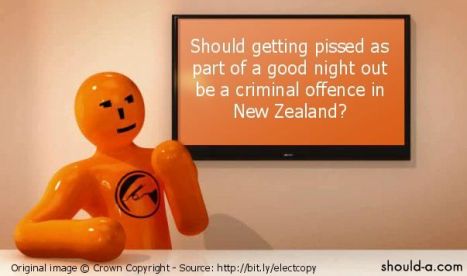Reading the online version of my local paper today, I was struck by the differences between New Zealand and the United States. The top story – so I presume it’s on the front-page of the dead tree version – has the headline “Armed police brought in to arrest man in Christchurch.”
This obviously wouldn’t be newsworthy in United States or other countries with highly militarized police forces. American officers routinely carry pistols and, if TV shows like Cops are any indication, are willing to get them out at every opportunity. Down here, the police don’t carry firearms and the use of the Armed Offenders Squad is relatively rare.
I think this is a major factor in the general professionalism and reasonableness of New Zealand cops. While there are bound to be a few sociopaths in any police force, police brutality and arrogance seem much less common here than in the States.
Compare and contrast:
To my knowledge, no reliable measures of police misconduct exist, but I don’t think this is just denominator-blindness: pointing guns at, tasing, pepper-spraying, or handcuffing people not posing any immediate threat seems to be common practice in the US, but is very rare here.
Guns and tasers give cops a greater sense of authority and dominance. It’s a cliché, but power does corrupt. I challenge anyone to watch video of the Stanford Prison Experiment and maintain that it’s possible to give person power over another without it being abused:
A bunch of normal young guys were randomly assigned to be either prisoners or guards in a mock prison. The experiment was due to run for a week, but had to be called off early after the guards became increasingly cruel – with situations eerily similar to those in Abu Ghraib – and the prisoners increasingly accepted the dominance of the guards. Normal people became either sociopaths or cowering messes depending simply on the roles they were assigned.
There are frequent calls to arm the New Zealand police, especially after an officer is killed or injured on the job, and the use of tasers is becoming more common. Needless to say, I think this is a very bad idea. Arming the police might make them slightly more capable of fighting genuine crime, but it’s almost certain to make them into a group to be feared by innocent New Zealanders.
Opposition to an armed police force isn’t based on nostalgia, as some would claim, but an understanding of human psychology. Citizens should not be afraid of their police, and police should definitely not be pointing guns at citizens without a very good reason for doing so.
Filed under: libertarian, New Zealand, video | Tagged: arbitrary power, armed police, militarization of the police, New Zealand, nz politics, police, police brutality, psychology, Stanford Prison Experiment | 2 Comments »


